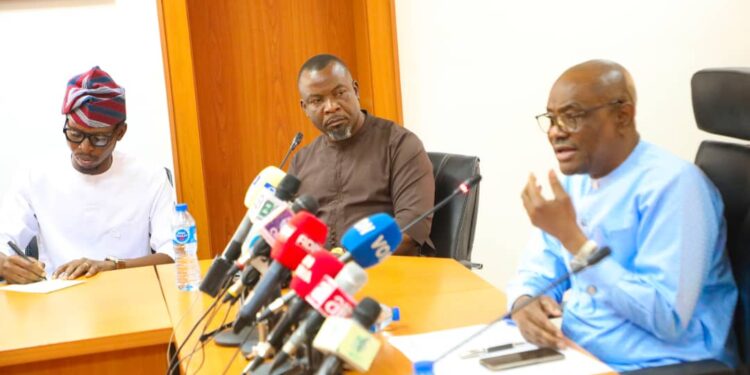Minister of the Federal Capital Territory, Barrister Ezenwo Nyesom Wike has said that the FCT Administration is open to partnering with genuine real estate developers in the nation’s capital.
The Minister said this when he received a delegation from Real Estate Developers Association of Nigeria (REDAN), FCT Chapter, led by the Chairman, Dr. Okoruwa Anthony Ehikioya on a courtesy visit to the FCT Administration on Thursday, May 9th, 2024.
Barrister Wike who highlighted the importance of collaboration in real estate development in order to reduce the housing shortfall in the country, commended the association for showing interest in partnering with the government.
He however stressed that the FCTA will only go into partnerships that will be mutually beneficial, adding that the Administration has also introduced measures to ensure that only genuine developers are encouraged to participate in real estate development in the FCT.
As part of these measures, the Minister said a financial institution, forthwith must undertake that a real estate developer has the financial capacity to carry out any stated project, while the developer must also commit to completing the project within a specified time frame or forfeit the land titles without conditions.
The Minister said, “What we have done now, yes, you want to develop land, yes you have to show the financial capacity, a bank will undertake that you have the financial wherewithal for such development.
“Secondly, you will undertake that this project must be started and finished within a given timeframe, without any condition attached to that title.
“Three, that failure to develop this, the government is entitled to take back their land no matter what form of development you have put in there. Government is entitled to take their land bank.
He further stressed that government will not allocate land to anybody or organisation that is only interested in selling allocated land.
He said, “Government can on its own decide to sell land. So, why would government give out land for the purposes of housing estate and then you are selling the land to people. We could as well have sold the land ourselves if that is the case”.
Barrister Wike also decried that many real estate developers in the FCT were not fulfilling their obligations as regards the payment of taxes relating to ground rents and sale of properties, among others, reiterating that the government requires such revenue to carry out development activities.
To checkmate this, the Minister said, that the FCT Administration as a policy will only sign letters of consent when it is determined that all the fees accruable to the government have been paid in full as provided by law.
Barrister Wike also expressed worries about the issues of land grabbing in the FCT and assured that the FCT Administration will continue to do its best to address the situation.
Speaking earlier, the Chairman, of Real Estate Developers Association of Nigeria (REDAN), FCT Chapter Okoruwa Anthony Ehikioya, said the EXCO as agents of development in the FCT were on the visit to thank the Minister over his development efforts in the FCT and express their desire for partnership in real estate development with the government.
The Chairman, while also lamenting the various issues of land grabbing and land racketeering that have bedeviled the real estate sector, said such actions have cast them in a bad light and put their members in a very difficult situation. He revealed that the association has chosen to come and proffer solutions to some of the existing problems.
Ehikioya further expressed the desire to collaborate with the FCT Administration in order to provide comfortable and affordable housing in the FCT saying “We are looking at within the period of this period of our administration, producing about 15000 units of houses for the FCT and in doing this, we are looking at a partnership with the government”.
Also present at the event were the Chief of Staff to the Minister Hon. Chidi Amadi, FCTA Head of Service, Dr Samuel Atang, Executive Secretary, FCDA, Engr Shehu Hadi Ahmed, and other senior officials of the FCTA and REDAN.











